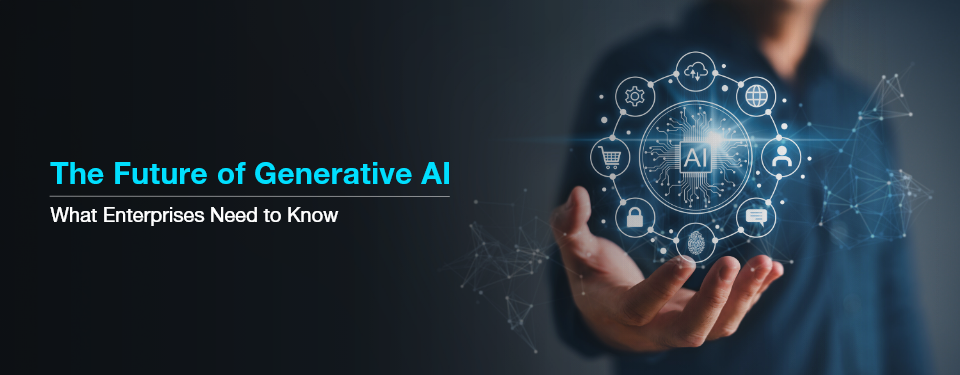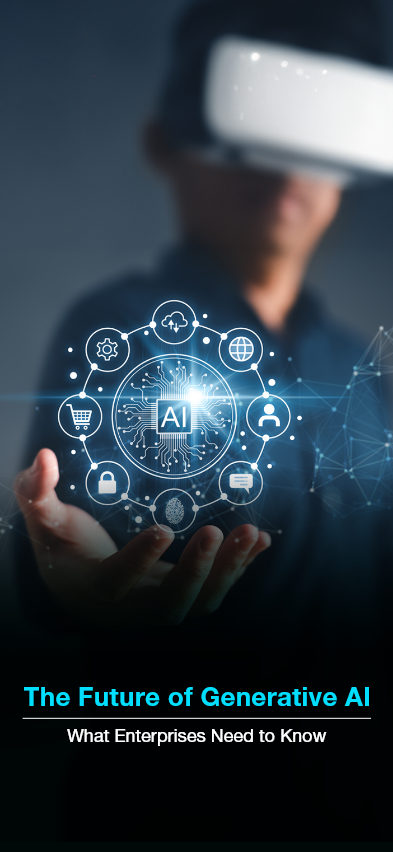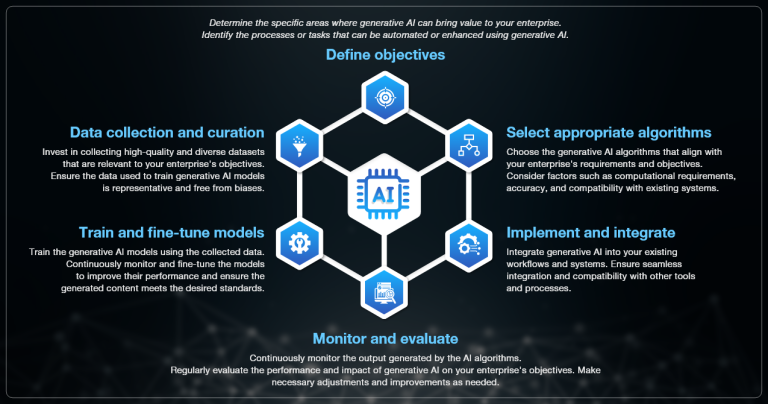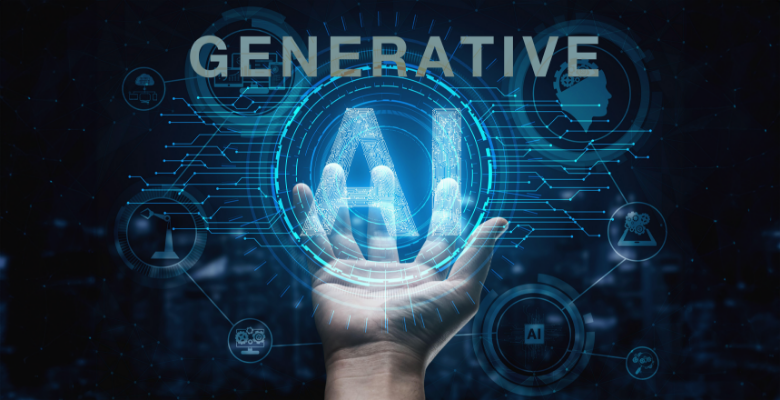The Future of Generative AI: What Enterprises Need to Know


“Generative AI has the ability to transform various industries by automating and enhancing creative processes.”
In the field of design and art, generative AI can create unique and visually stunning images, logos, and graphics. For instance, designers can input certain parameters and let the algorithm generate countless variations of a logo design, saving time and effort. In the entertainment industry, generative AI can be used to create realistic characters, landscapes, and special effects for movies and video games, providing a more immersive experience for audiences.
In the field of marketing, generative AI can be a game-changer. It can analyze vast amounts of data to create personalized and engaging content for targeted audiences. For example, generative AI can generate social media posts, blog articles, and even advertisements that resonate with specific customer segments. This not only saves time and resources but also ensures that the content is tailored to the preferences and needs of individual customers.
Generative AI also has significant implications in the healthcare industry. It can assist in medical imaging analysis, helping doctors identify patterns and anomalies in scans more accurately and efficiently. Additionally, generative AI can be used to generate synthetic patient data for training medical professionals, ensuring they have access to diverse and realistic scenarios to enhance their skills.
The adoption of generative AI in enterprises brings several benefits. Firstly, it can significantly speed up the creative process. Traditionally, creating high-quality content, such as images or videos, required skilled professionals and substantial time investment. With generative AI, businesses can automate content creation, generating a vast amount of content in a fraction of the time. This acceleration allows enterprises to stay ahead of competitors and respond quickly to market demands.
Secondly, generative AI enables businesses to enhance personalization. By analyzing customer data and preferences, generative AI algorithms can generate tailored content that resonates with individual customers. This level of personalization can improve customer engagement and increase conversion rates. For example, an e-commerce company uses generative AI to create personalized product recommendations based on a customer’s browsing history and preferences, leading to a more targeted and effective marketing approach.
Moreover, generative AI helps businesses reduce costs. By automating content creation and streamlining processes, enterprises can allocate resources more efficiently. This not only reduces the efforts for human resources but also eliminates the potential for human error.
While generative AI holds immense potential, it also comes with its fair share of challenges and limitations. One of the primary concerns is the lack of control over the output. Generative AI algorithms learn from vast datasets, which may include biases or inappropriate content. There is a risk that the generated content may inadvertently contain offensive or harmful elements. Therefore, it is crucial for enterprises to carefully monitor and fine-tune the algorithms to ensure the output aligns with their brand values and ethical standards.
Another challenge is the requirement for vast amounts of high-quality data to train the generative AI models effectively. Building a comprehensive and diverse dataset can be time-consuming and resource-intensive. Additionally, the quality of the data used for training directly affects the quality of the generated content. Insufficient or biased data can lead to inaccurate or unreliable output. Enterprises must invest in data collection and curation to overcome this limitation and ensure the generative AI models produce reliable and valuable content.
Furthermore, generative AI algorithms are complex and require significant computational power. Training and running these algorithms can be computationally expensive, requiring substantial hardware resources. Small and medium-sized enterprises may face challenges in adopting generative AI due to the infrastructure requirements and associated costs. However, as technology advances and becomes more accessible, these limitations are likely to become less prominent.
The future of generative AI in enterprises is promising. As the technology continues to evolve, we can expect more sophisticated algorithms capable of generating even more realistic and diverse content. Enterprises will have access to a wide range of tools and applications that can automate and enhance various creative processes. From design and marketing to healthcare and entertainment, generative AI will become an integral part of businesses across industries.
Additionally, generative AI will likely play a significant role in the development of virtual and augmented reality experiences. By generating realistic and immersive environments, generative AI can enhance the user experience and blur the line between the physical and digital worlds. Enterprises can leverage this technology to create captivating virtual showrooms, training simulations, and interactive experiences that enable customers to engage with products and services in new and exciting ways.
Furthermore, generative AI has the potential to revolutionize the field of research and development. By generating new ideas and concepts, generative AI can assist scientists and engineers in discovering innovative solutions to complex problems. This can accelerate the pace of innovation and drive advancements in various scientific domains, such as drug discovery, materials science, and renewable energy.
As with any emerging technology, the use of generative AI raises ethical considerations that enterprises must address. One major concern is the potential for misuse or malicious intent. Generative AI algorithms can be used to create deepfakes or manipulate content to deceive or harm individuals or organizations. Enterprises must establish guidelines and ethical frameworks to ensure responsible and ethical use of generative AI. This includes implementing stringent verification processes and educating employees and users about the risks associated with manipulated content.
Another ethical consideration is the potential impact on employment. As generative AI automates creative processes, it is important to note that generative AI can also augment human creativity, enabling professionals to focus on higher-level tasks that require critical thinking and emotional intelligence. Enterprises must find a balance between leveraging generative AI for efficiency and preserving human creativity and expertise.
Moreover, enterprises must be transparent and accountable in their use of generative AI. It is essential to clearly communicate to customers when content is generated by AI algorithms, ensuring transparency and trust. Additionally, enterprises must comply with data privacy regulations and ensure the responsible handling of customer data used to train generative AI models.

Generative AI is rapidly evolving and has the potential to transform various industries. From automating content creation to enhancing personalization and driving innovation, generative AI offers numerous benefits for enterprises. However, it also comes with challenges and ethical considerations that need to be carefully addressed.
As technology advances and becomes more accessible, enterprises will have the opportunity to leverage generative AI to streamline processes, improve customer experiences, and drive competitive advantage.
By embracing generative AI and understanding its potential impact, enterprises can position themselves at the forefront of innovation and stay ahead of the curve in this rapidly evolving digital landscape. Talk to our experts to implement the Generative AI for your enterprise
Author

